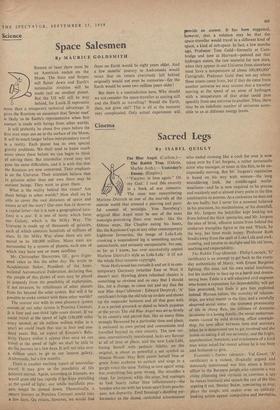Cinema
Sacred Legs
By ISABEL QUIGLY
The Blue Angel. (Carlton.)— The Rabbit Trap. (Odeon, Marble Arch.) — Yesterday's Enemy. (Empire.) "'FALLING ii love again." Oh my God.' I read this recently in a book of war memoirs.
, 6 The man was remembering Marlene Dietrich as one of the marvels of the outside world that aroused a piercing and pain- ful amount of nostalgia. Von Sternberg's original Blue Angel must be one of the most nostalgia-provoking films ever made : like the Odessa steps, like Chaplin eating his boots, like the Keystone Cops or any other contemporary highbrow favourites, the image of Lola-Lola crooking a suspendered leg is something sacred, untouchable, and certainly unrepeatable. No one, as far as I know, has ever successfully copied Marlene Dietrich's style as Lola-Lola : it (if not the whole film) remains copyright.
Now Hollywood has remade it and set it in con- temporary Germany (whether East or West it doesn't say). Howling dciwn rehashed classics is something so obvious and so easy that I should like, for a change, to come out and say that the new Blue Angel (director : Edward Dmytryk; 'A' certificate) brings the old tale up to date and shows up the suspender business and all that goes with it as a period gimmick as dated as beach pyjamas or the yo-yo. The old Blue Angel was set so firmly 'in its country and period that, like so many filMs strongly flavoured by a particular time and place, it outlasted its own period and conventions and travelled beyond its own country. The new ver- sion, internationally intentioned, lacks any flavour at all of time or place; and the new Lola-Lola, basing herself with pathetic fidelity on the original, is about as powerful a sex symbol as Minnie Mouse. May Britt paints herself blue or green from eyebrow to eyelash and sings in a gargly voice the same 'Falling in love again' song; but everything has gone wrong. She straddles a chair, for instance, while she sings, but manages to look hearty rather than inflammatory—the hoyden who sits with her knees apart from gauche- ness, not depravity. Emil Jannings's dazzling per- formance as the dazed, cuckolded schoolmaster who ended crowing like a cock for ever is now taken over by Curt Jurgens, a rather unversatile actor who manages, at times in this film, to be un- expectedly moving. But Mr. Jurgens's reputation is based on his way with women--the long smouldering look, the middle-aged world- weariness—and he is now required to be precise and maidenly and at almost every point in the film unattractive to women. As a caricature he does not do too badly; but I never for a moment believed in his precision, his maidenliness, or his downfall, for Mr. Jurgens the ladykiller kept looking out from behind the thick spectacles, and Mr. Jurgens the man of brisk, eflicient action from behind the unshaven tramplike figure at the end. Which, by the way, has been made happy. Professor Rath breaks away from the spell of Lola-Lola and cock- crowing, and returns to daylight and his old loves, teaching and respectability.
The Rabbit Trap (director : Philip Leacock; Certificate) is an attempt to get back to the every- day authenticity of Marty, with Ernest Borgnine fighting, this time, not his own social loneliness, but his inability to face up to a harsh and domin- eering boss. Eddie is a self-educated civil engineer who hopes a reputation for dependability will get him promoted, but finds it gets him exploited instead. Human values, 'the morality of relation- ships, are what matter in the film; and a carefully observed social scene : the tiresome promiscuity of life in cheap flats, the jolliness of domestic occasions in a loving family, the social embarrass- ments caused by mild drinking, office comrade- ship, the love affair between boss and secretary when he is determined not to get involved and she insists on taking it all too seriously; and the fright, apprehension, boredom, and evasiveness of a kind man when asked for moral advice he is top busy and bothered to give.
Yesterday's Enemy (director : Val Guest; 'A' certificate) is a violent, illogically argued and dubiously intentioned war film about a British officer in the Burmese jungle who commits a war crime (shooting two civilians to convince a spy he means business) and spends the rest of the film arguing it out. Stanley Baker, convincing as ever, plays the tough, and makes even an unlikely- looking action appear compulsive and inevitable.


































 Previous page
Previous page